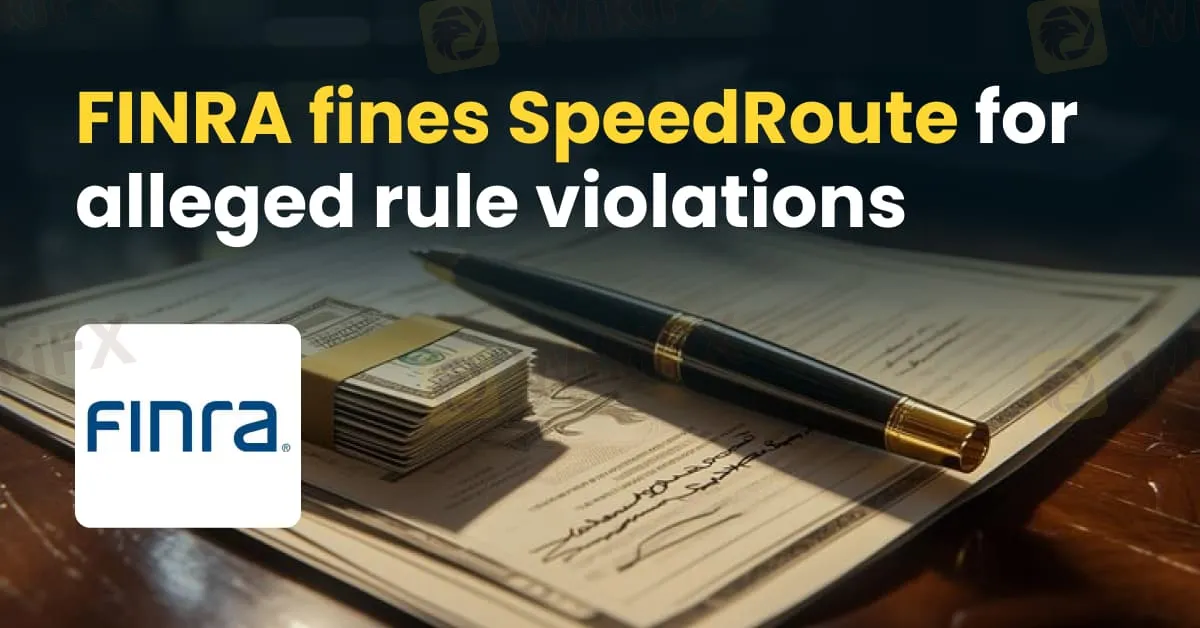FINRA fines SpeedRoute for alleged rule violations
Abstract:The Financial Industry Regulatory Authority (FINRA) has imposed a $300,000 fine on SpeedRoute LLC for a series of supervisory, risk management, and anti-money laundering (AML) program deficiencies spanning from 2017 to the present. Of this amount, $75,000 is payable to FINRA, with the remainder offset by SpeedRoute’s limited ability to pay. In addition to the monetary penalty, SpeedRoute has been censured and ordered to overhaul its compliance framework, including enhancing its written supervisory procedures (WSPs) for market access controls and strengthening its AML program.

The Financial Industry Regulatory Authority (FINRA) has imposed a $300,000 fine on SpeedRoute LLC for a series of supervisory, risk management, and anti-money laundering (AML) prograThe Financial Industry Regulatory Authority (FINRA) has imposed a $300,000 fine on SpeedRoute LLC for a series of supervisory, risk management, and anti-money laundering (AML) program deficiencies spanning from 2017 to the present. Of this amount, $75,000 is payable to FINRA, with the remainder offset by SpeedRoutes limited ability to pay. In addition to the monetary penalty, SpeedRoute has been censured and ordered to overhaul its compliance framework, including enhancing its written supervisory procedures (WSPs) for market access controls and strengthening its AML program.
m deficiencies spanning from 2017 to the present. Of this amount, $75,000 is payable to FINRA, with the remainder offset by SpeedRoutes limited ability to pay. In addition to the monetary penalty, SpeedRoute has been censured and ordered to overhaul its compliance framework, including enhancing its written supervisory procedures (WSPs) for market access controls and strengthening its AML program.
Background on SpeedRoute LLC
SpeedRoute LLC is a Delaware-formed, agency-only routing broker-dealer, headquartered in Jersey City, New Jersey, with additional offices in New York City. Since its registration with the SEC and FINRA in 2000, SpeedRoute has specialized in providing market access and execution services to broker-dealer clients, routing U.S. equity orders to exchanges, dark pools, and other liquidity venues.
Alleged Rule Violations
Market Access Risk Management Controls
Between April 2022 and the present, SpeedRoute “failed to establish, document, and maintain risk management controls and supervisory procedures reasonably designed to manage the financial risks associated with its provision of market access,” in violation of Section 15(c)(3) of the Securities Exchange Act of 1934 and Exchange Act Rules 15c3-5(b), 15c3-5(c)(1)(i), and 15c3-5(c)(1)(ii). These rules—often referred to as the “Market Access Rule”—require broker-dealers to implement pre-trade controls (e.g., credit limit checks, order price/size parameters) and periodic reviews to prevent the entry of erroneous or manipulative orders.
Supervisory Procedures for Potentially Manipulative Trading
From August 2017 through December 2023, SpeedRoute “failed to establish and maintain a supervisory system, including written supervisory procedures, reasonably designed to achieve compliance with applicable federal securities laws and FINRA rules prohibiting potentially manipulative trading,” in violation of FINRA Rules 3110 and 2010. These lapses contravened the core requirements of FINRA Rule 3110, which mandates that firms maintain a “reasonably designed” supervisory system and WSPs tailored to their business model and risks.
Anti-Money Laundering Program Deficiencies
SpeedRoute also failed “to develop and implement a written anti-money laundering (AML) program reasonably designed to achieve and monitor its compliance with the Bank Secrecy Act (BSA) and the implementing regulations thereunder,” constituting a violation of FINRA Rules 3310 and 2010. FINRA Rule 3310 requires member firms to:
- Establish and implement AML policies and procedures capable of detecting and reporting suspicious activity under 31 U.S.C. § 5318(g).
- Conduct annual independent testing of the program.
- Designate and notify FINRA of an AML compliance officer.
- Provide ongoing AML training for staff.
- Maintain internal controls aligned with the BSA and its regulations.
Sanctions Imposed
For these collective violations, FINRA imposed a $300,000 fine on SpeedRoute LLC, with $75,000 payable directly to FINRA. The firm was also censured and required to implement a revised compliance framework focusing on:
- Robust pre-trade and post-trade risk controls.
- Comprehensive, risk-based surveillance procedures.
- A fully documented, senior-management-approved AML program. These remedial measures are designed to ensure ongoing adherence to Exchange Act Rule 15c3-5, FINRA Rule 3110, and FINRA Rule 3310.
Implications for the Industry
This enforcement action underscores the critical importance of maintaining holistic compliance frameworks for market access providers. Firms must:
- Integrate automated pre-trade controls that align with credit and market risk tolerances.
- Develop WSPs that clearly outline surveillance methodologies, escalation thresholds, and review responsibilities.
- Allocate sufficient, qualified resources to AML compliance, ensuring surveillance alerts are thoroughly investigated and documented. Failure to do so not only invites financial penalties and reputational harm but also jeopardizes market integrity by allowing erroneous or manipulative trading to go unchecked.
Conclusion
The SpeedRoute case serves as a potent reminder that supervisory diligence, robust risk controls, and vigilant AML programs are non-negotiable in todays regulatory landscape. Market access firms must continuously evaluate and enhance their compliance systems to prevent similar enforcement actions and preserve investor confidence.

Read more

Forex Candles - What Value Do They Add to Your Trading Experience?
Wondering where you can see the forex price movement information? Easy, it’s all there on forex candles, which demonstrate different market sentiments to help traders make informed decisions. Keep reading to learn more.

Risky Choice? What Traders Should Know About Bold Prime
Risk exists everywhere — even well-known brokers are not exceptions. But they often don’t talk about the risks. Instead, they highlight their strengths and try to attract customers while hiding the potential downsides. However, in this article, you’ll learn about the risks involved with Bold Prime.

From Novice to Pro: Why Investors Trust Land Prime?
If you're passionate about forex trading and ready to begin your journey as a trader, this article is worth exploring. It highlights the key features that Land Prime offers to both traders and investors.

Axi launched a new liquidity service named AxiPrime
This week, Sydney-based broker Axi unveiled AxiPrime, a dedicated institutional liquidity offering, and announced a technology partnership with YouBourse to accelerate its rollout. In this article, we’ll share our hands-on review, explain the service’s core benefits and limitations, and provide context on how it fits into the evolving landscape of institutional trading platforms.
WikiFX Broker
Latest News
Top Wall Street analysts are upbeat about these dividend-paying stocks
Singapore's economy grows 4.3% in second quarter, beating expectations
What WikiFX Found When It Looked Into Emar Markets
MT4 vs MT5 Which Forex Trading Platform Fits Your Needs in 2025?
Stock futures slide on more Trump tariff letters, but are off worst levels of session: Live updates
Short or Long Term: Which to Choose for Double-Digit Returns from Gold Investments?
Gold Soars Above $3,350 as XAU/USD Rallies on Trade Tensions
Asia-Pacific markets trade mixed as investors assess Trump's latest tariff threats; bitcoin hits new highs
What is Forex Trading Simulator?
Switzerland tourism boosted as women's soccer continues record-breaking rise
Rate Calc
